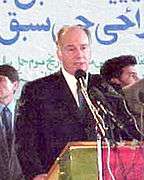Honorary Canadian citizenship
Honorary Canadian citizenship (French: Citoyenneté canadienne honoraire) is an honour wherein Canadian citizenship is bestowed by the Governor-General-in-Council,[1] with the approval of parliament where appropriate,[2] on foreigners of exceptional merit. It is a symbolic honour; the recipient does not take the Oath of Citizenship and thus does not receive any rights, privileges, or duties typically held by a Canadian citizen.[2]
| # | Name | Image | Award date | Information |
|---|---|---|---|---|
| 1 | Raoul Wallenberg |  |
1985 (posthumous) |
Swedish diplomat and humanitarian.[3] |
| 2 | Nelson Mandela | .jpg) |
2001 | Anti-apartheid activist, former President of South Africa, and recipient of the 1993 Nobel Peace Prize.[4] |
| 3 | Tenzin Gyatso | 2006 | The 14th Dalai Lama and recipient of the 1989 Nobel Peace Prize.[5] | |
| 4 | Aung San Suu Kyi |  |
2007 | Burmese opposition leader and recipient of the 1991 Nobel Peace Prize.[6] |
| 5 | Karim Aga Khan IV |  |
2010 | 49th Imam of the Shia Ismaili Muslims.[7][8] |
| 6 | Malala Yousafzai |  |
2014[9] | Women's rights and education activist and recipient of the 2014 Nobel Peace Prize.[10] |
See also
References
- ↑ Citizenship and Immigration Canada: CP7: Waivers; 1. Waivers, 1.22. Governor-in-Council directs Minister
- 1 2 Citizenship and Immigration Canada; Canadian Immigration and Citizenship Indexing Terms - H
- ↑ Government of Canada Honours Canadian Honorary Citizen Raoul Wallenberg, Department of Canadian Heritage News Release, January 16, 2003
- ↑ http://www2.parl.gc.ca/HousePublications/Publication.aspx?DocId=2332124&Language=E&Mode=1&Parl=37&Ses=1#LINK243
|chapter-url=missing title (help). Parliamentary Debates (Hansard). House of Commons. 2001-06-12. - ↑ http://www2.parl.gc.ca/HousePublications/Publication.aspx?pub=hansard&mee=46&parl=39&ses=1&language=E&x=1#SOB-1619342
|chapter-url=missing title (help). Parliamentary Debates (Hansard). House of Commons. 2006-06-22. - ↑ http://www2.parl.gc.ca/HousePublications/Publication.aspx?Language=E&Mode=1&Parl=39&Ses=2&DocId=3078171#SOB-2175517
|chapter-url=missing title (help). Parliamentary Debates (Hansard). House of Commons. 2007-10-17. - ↑ http://www.parl.gc.ca/HousePublications/Publication.aspx?Language=E&Mode=1&Parl=40&Ses=2&DocId=4012641#SOB-2849627
|chapter-url=missing title (help). Parliamentary Debates (Hansard). House of Commons. 2009-06-19. - ↑ "Mawlana Hazar Imam is made an honorary citizen of Canada". TheIsmaili.org. 22 June 2009. Retrieved 26 May 2010.
- ↑ Senate motion
- ↑ "Malala Yousafzai to get honorary Canadian citizenship". CBC. October 15, 2013. Retrieved October 16, 2013.
This article is issued from Wikipedia - version of the 1/25/2015. The text is available under the Creative Commons Attribution/Share Alike but additional terms may apply for the media files.
